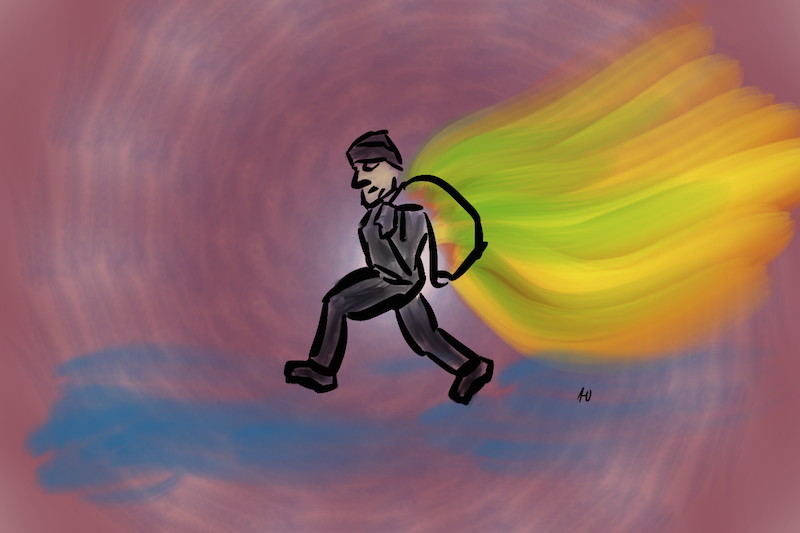The police station was nice and quiet as usual. The policemen who worked to keep the Didwell Village safe, actually had very easy jobs, because their village had such a low crime rate. They would spend their days leaning back on their chairs, chatting, laughing and dosing, wondering what wonderful food they might have for supper.
There was only four of them, and the chief of police was at his desk, leaning his chair back against the wall behind him, throwing a single juggling ball up high into the air and then catching it again with the same hand. He was wearing a handsome tweed jacket, and with the hearty weight of the man, it looked like the legs of the chair beneath him may snap at any moment. The other two officers were sitting on chairs reading their newspapers, occasionally enjoying a nice mouthful of tea.
Then one of the younger officers, Hoskins, entered the main room.
“Sir, we’ve just had a call come in from Marlydale Road. It’s another one of them energy thieves, sir.”
The chief dropped his juggling ball and suddenly sat bolt upright, his chair legs crashing into the floor as he sat forward.
“Again?” he replied, looking alarmed. He stared at the floor for one second, and then said, “Right, let’s go.”
They hurried out, the chief grabbed his coat, and Hoskins grabbed his hat. The other two were still reading their papers, as if they had heard nothing of what had just gone on.
“You two keep the station safe,” the chief called back at them as he ran out of the door. The two remaining officers just turned their pages over gently.
Hoskins drove fast over to Marlydale Road, where they arrived at a row of terraced houses. Number 42 had its door open, and an old lady was standing in the door, looking disheveled and crying. The chief noticed she was holding a tissue in her hand to mop at her tears.
Hoskins parked precisely but sharply by the side of the road, and the two policeman got out of the car, and made their way over to the lady. They could hear her crying, and they could feel some eyes peering at them from behind windows and curtains from neighbouring houses.
“You called us, madam?” asked the chief, concerned for the lady.
“Yes, yes,” she replied, sniffing. “Yes, I don’t know what happened, I had no idea until they were gone. This has happened to me twice in a year now!”
“Alright madam, alright.” Hoskins placed his hand on her shoulder to comfort her. “Shall we step inside so we can talk this over?”
To the neighbours looking out from their own windows, the three entered the house, and disappeared behind the closed front door.
As Hoskins and the chief entered the cosy home, through the small landing area and into the neat little kitchen, they both had an uneasy feeling that this kind of crime was on the rise, and they had no idea of how to go about stopping it.
“I’ll make the tea,” Hoskins said, noticing how tired the old lady looked. She smiled and thanked him ever so much, and slowly sat down to speak to the chief, who had his pen and paper at the ready.
“Now madam,” he said, clicking his pen to expose the writing end, “tell us, as best as you can, exactly what happened.”
The lady rubbed her head, as if she were in pain. “Oh I can barely remember,” she said. “It all happened so fast. My niece had a new boyfriend, and she brought him round to meet me. He seemed lovely at first, very handsome actually, but at one point when we were sitting here, right here,” she pointed to the table, “my niece had to go outside and take an important phone call. She must have been out there for about fifteen minutes, and that’s when it must have happened.”
The chief was scribbling all of this down as best he could, and Hoskins was just finishing the teas, making clinking noises with the spoon on the cups.
“Please, go on,” the chief said as Hoskins sat down next to him, handing out three teas.
The lady took a sip.
“Well,” she said, “I asked him what his job was like, I’d heard he’d got a new job working over at the food factory. And then he just started to tell me everything that was wrong with the place. Not just the place, but the people as well. Everything was about what was wrong, what was bad, how he wished it were different, all that kind of thing, and as I listened to him I could feel all the life being drained out of me. He didn’t stop. I couldn’t rest. I couldn’t even get a word in. He just kept talking at me, moaning and moaning and complaining, until by the time my niece walked back in, she said they had to leave, and as they left I felt absolutely exhausted. I don’t know what it was, but I’m sure he must have been an energy thief. He looked lighter when he left, more happy and unburdened, you know? Whereas I felt as if I’d had a load of s*** dumped on me.”
Hoskins nearly choked on his tea as he heard those final few words come out of the little old lady, and she was drinking her tea, looking slightly better.
“You mentioned this has happened before?” the chief asked.
“Yes, but I didn’t report it. I didn’t know it had happened, I met with an old work friend, I hadn’t seen her in years. She said she wanted a catch up, and when we did meet up, all she did was tell me about her problems. A few times she asked me about myself, but she wasn’t interested, she was just trying to be polite, which made the whole thing even more hard work. I don’t know what it is, officer. Perhaps I’m an easy target?”
“No no no,” said the chief, finishing his note-taking. “No, now you must not think like that.”
“I am, I am an easy target aren’t I?”
“No madam, I assure you…”
The old lady began to cry again, and the chief moved his chair round to console her.
For a good ten minutes, both policemen were working hard to convince this lady that it was not her fault, that it could happen to anyone, that there was nothing she had done wrong.
“Now I must say, these energy thieves are very hard to put away,” the chief said, in a tentative voice that tried to reach through the tears of the lady. “The reason they are hard to put away, is that the law is very vague about this kind of thing. People losing their energy can be easily explained away, and the jurisdiction is still very unclear on what exactly constitutes a direct energy theft.”
“Oh, dear,” the lady said. “Well, you’ll do your best won’t you?”
“Indeed, indeed we will madam,” said Hoskins.
“I will say, madam,” the chief added, “that in terms of prevention, occurrences such as these seem to happen much more frequently when a person is interested, or even pretends to be interested, in the energy thief. If you lose your interest with what they are saying, and if you don’t pretend as if you are interested, then it is much more difficult for them to steal your energy.”
The lady sipped her tea and nodded silently.
“Now, we have this fellow’s name, and we will be making an enquiry as soon as we get back to the police station,” the chief said, squarely. “Is there anything else we can do for you before we leave you?”
“Umm, well I’m not sure,” the lady said, shifting in her seat slightly, “have you ever watched that programme about those aspiring singers on the television?”
“No,” the chief replied. Hoskins replied yes. Neither wanted to discuss it, they had work to be getting on with, but they could not bear to just interrupt this little old lady, who was now giving them both an in-depth description of the programme, along with her own review of it. When she had finished, she began to tell them about her grandchildren, and how marvelous they all were. One was a bit naughty from time to time, but that wasn’t his fault, it was the mother’s.
This kind of thing went on for another twenty minutes. The chief and Hoskin’s teacups were bone dry, and they were almost squirming inside to get away. They were extremely bored, but out of habit, would carry on engaging with the lady, nodding, adding in the occasional “Yes” and “Oh really?” At one point Hoskins even asked what each of the lady’s grandchildren were called, and this kept her going a while longer. Eventually it was becoming ridiculous, and the chief stood up and said, “Ok, madam, now we really must be getting on with our work.”
They stayed another five minutes, talking about this and that, after which the two policemen made their way out of the house as quickly as they could, being as polite as possible, and thanking her for the tea. She was in a real full-flow now, and was still talking as they were walking down the little path that led them away from her front door.
The two made it back to the car, got in, and her voice from outside was greatly muffled. She was waving them goodbye as they drove off.
Hoskins could feel his eyes were now suddenly very heavy, and noticed that the chief next to him was yawning.
“Um, sir…” Hoskins said, feeling as if he could do with a nap.
“Yes, Hoskins?” the chief said, covering his mouth with his papers as he yawned.
“Who do we call if we’ve just been done by an energy thief?”

Originally published at www.innerpeacenow.com


